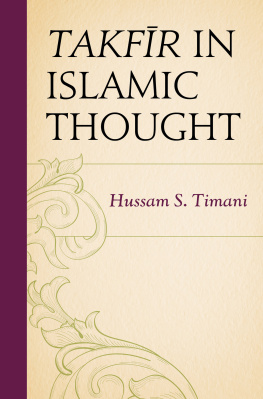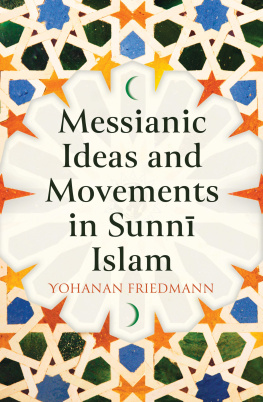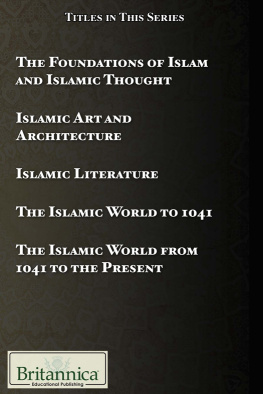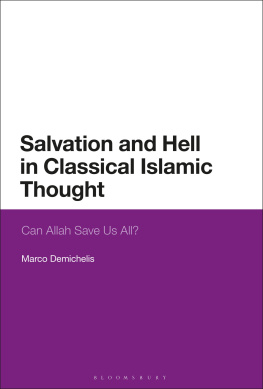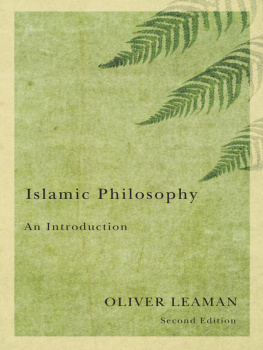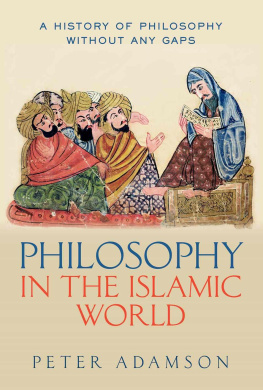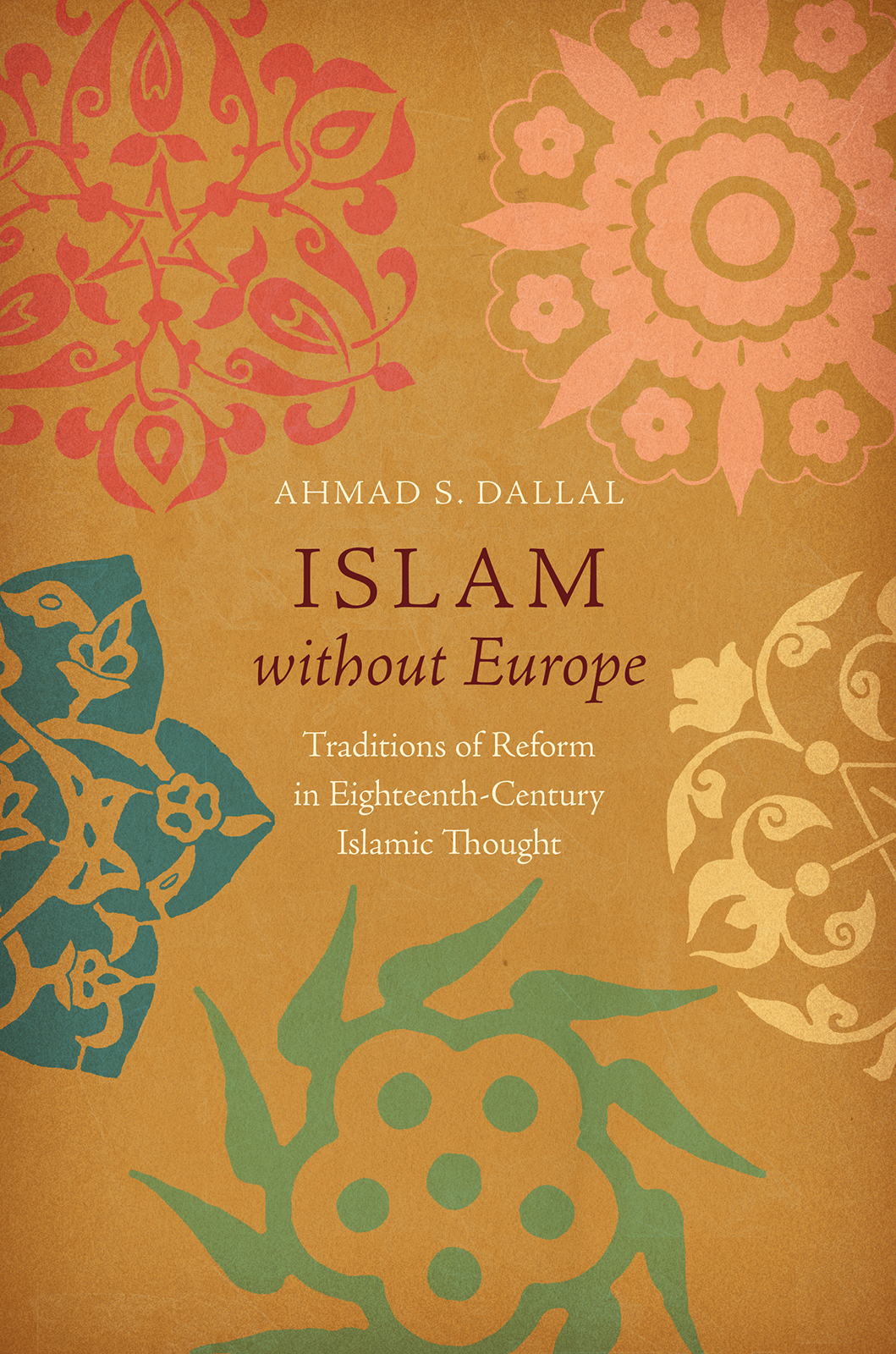Contents
Islam without Europe
Islamic Civilization and Muslim Networks
Carl W. Ernst and Bruce B. Lawrence, editors
Highlighting themes with historical as well as contemporary significance, Islamic Civilization and Muslim Networks features works that explore Islamic societies and Muslim peoples from a fresh perspective, drawing on new interpretive frameworks or theoretical strategies in a variety of disciplines. Special emphasis is given to systems of exchange that have promoted the creation and development of Islamic identitiescultural, religious, or geopolitical. The series spans all periods and regions of Islamic civilization.
A complete list of titles published in this series appears at the end of the book.
Islam without Europe
Traditions of Reform in Eighteenth-Century Islamic Thought
AHMAD S. DALLAL
The University of North Carolina Press
Chapel Hill
This book was published with the assistance of the Anniversary Fund of the University of North Carolina Press.
2018 The University of North Carolina Press
All rights reserved
Manufactured in the United States of America
Set in Adobe Text Pro by Tseng Information Systems, Inc.
The University of North Carolina Press has been a member of the Green Press Initiative since 2003.
Cover illustrations from Persian Designs (Amsterdam: The Pepin Press / Agile Rabbit editions, 2007), www.pepinpress.com.
Library of Congress Cataloging-in-Publication Data
Names: Dallal, Ahmad S., author.
Title: Islam without Europe : traditions of reform in eighteenth-century Islamic thought / Ahmad S. Dallal.
Description: Chapel Hill : The University of North Carolina Press, [2018] |
Series: Islamic civilization and Muslim networks | Includes bibliographical references and index.
Identifiers: LCCN 2017054850| ISBN 9781469640341 (cloth : alk. paper) | ISBN 9781469641409 (pbk : alk. paper) | ISBN 9781469640358 (ebook)
Subjects: LCSH: Islam18th century. | Islamic countriesIntellectual life.
Classification: LCC BP55 .D35 2018 | DDC 297.09/033dc23 LC record available at https://lccn.loc.gov/2017054850
To my gracious and charming daughters,
Shezza and Kinda,
and their inspired and kindhearted brother,
Millal
( 14)
Read your own book. Suffice it today that you be accountable to yourself.
Qurn 17:14
Contents
Acknowledgments
I worked on this book intermittently over two decades, while based at different institutions. A significant part of the research was facilitated by a Yale University Morse Fellowship in the Humanities (199697) and a National Endowment for the Humanities Fellowship (20034). Sections of this work were presented at different forums at Yale University, Stanford University, Georgetown University, and the American University of Beirut, and at different conferences and workshops. I am grateful for all the valuable insights and ideas I received from colleagues and students on these and other occasions. I am especially indebted to my dear friends and colleagues Joel Beinin and Mary Wilson for their penetrating feedback, and for their unwavering friendship. I owe a huge thanks to Rosemary Stanfield and Rochelle Davis for their scholarly counsel and friendly sympathy and encouragement; they read earlier versions of the evolving book manuscript and offered valuable advice on its content and format. I am also grateful to the two manuscript reviewers for their very useful suggestions and comments. Needless to say, while I benefited greatly from this input, the views expressed in this book do not necessarily represent those of the above individuals or institutions, and I alone am responsible for any errors and shortcomings that may appear in the book.
At the early stages of working on this book, I used to discuss it with the late Eqbal Ahmad. Eqbal often pressed me to finish writing this book and told me that he would like to translate it to Urdu. He stayed with me throughout the writing of this book, as an inspiration and motivation for continuing to improve my knowledge and move this project forward. He, for one, would have appreciated the attraction of a tradition of dissent that perseveres for centuries and finally prevails, a tradition that, even when in power, does not shed its own memory of struggle.
I cannot adequately express my gratitude to my family. I learned much from Dalal about resilience and courage. For her intellectual and emotional companionship, and for our beautiful daughter, Kinda, I will always be in her debt. I dedicate this book to my wonderful children: Shezza, Millal, and Kinda. My life would not be as full and as rich as it has been without them. I look forward to the day when they can read and enjoy this book.
Islam without Europe
Introduction
Reimagining the Eighteenth Century
Sometime around the middle of the nineteenth century, the intellectual world of Muslims began to crumble and the great traditions of the past were forgotten. Contrary to common modern assertions, the recession of these traditions was sudden and unexpected. Throughout the eighteenth century and the early decades of the nineteenth, the Muslim world had witnessed one of the most lively and creative periods in its intellectual history. Echoes of this intellectual activity could still be felt in the late nineteenth and early twentieth centuries, yet nothing in this latter period approximated the erudition and depth of eighteenth-century thought. In the eighteenth century, enormous energies were devoted to a systematic and comprehensive restructuring of Islamic thought. The erudition of eighteenth-century thinkers and their honed historical consciousness enabled them to mold the past and fully appropriate its legacies. Classical styles of thinking were preserved, despite a great awareness of the need to reorganize religious knowledge and identify those aspects of Islam that were shared by all. From within the framework of classical learning, these thinkers dramatically restructured the intellectual world of Muslims. Diverse Islamic ideologies were forged and employed in Islamic sociopolitical as well as intellectual movements. Eighteenth-century models of Islamic activity ranged from political mobilization under the banner of classical Islamic ideology to the creation of a centralized network of Sufi settlements to purely intellectual reform embodied in new approaches to the study of traditional Islamic disciplines.
From the banks of the Ganges to the shores of the Atlantic, masses and elites alike embraced the relentless appeals of eighteenth-century Muslim thinkers. No other earlier period in Islamic history can boast of intellectual activities as self-consciously transformative and inclusive in their conception. Eighteenth-century thinkers were fully aware of the intellectual and political significance of their undertakings, and they embarked upon them with great self-confidence and optimism. Despite their alarmist tone, eighteenth-century thinkers had great hopes for the future: they asserted the potential superiority of later generations of Muslims over earlier ones and then proceeded to demonstrate this superiority; they articulated and espoused an Islam that transcends the boundaries of the schools of law and eradicates sectarian and legal differences; and they advocated the active participation of all Muslims in the definition of Islam and set out meticulously to chart the practical venues for this participation. From the perspective of the late nineteenth century, the intellectual ventures of the eighteenth century had failed to stand the test of time. Yet, judging by the record of the eighteenth century and its immediate aftermath, and not from later, hazy perceptions of this century, these ventures were quite successful and influential. The cultural vitality of the eighteenth century was not limited to certain regions but was spread over most of the Muslim world. The distinguished thinkers of this period came from India and Arabia, North Africa and West Africa, as well as Syria and Yemen. The diverse and rich legacies of this periodthe vibrant eighteenth-century intellectual activities in the Muslim world that developed independent of European influenceare the subject of this book.


